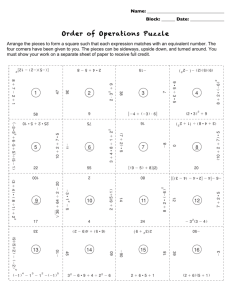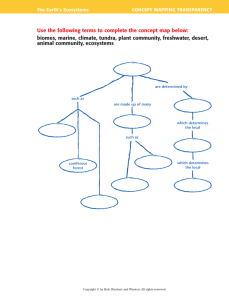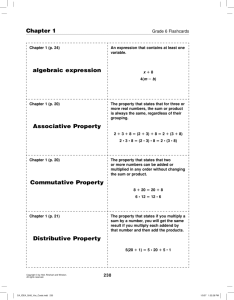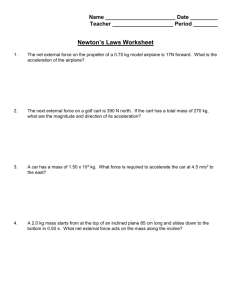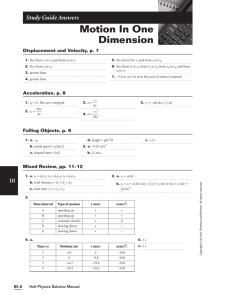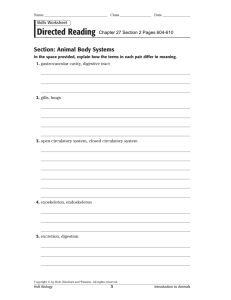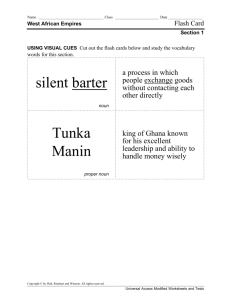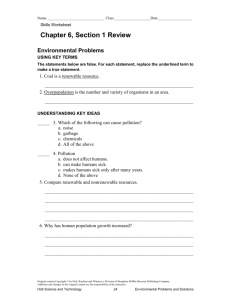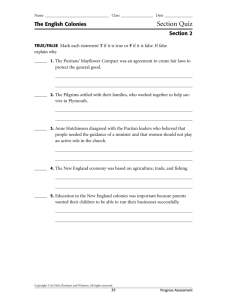CHAPTER 8 THINKING AND LANGUAGE
advertisement
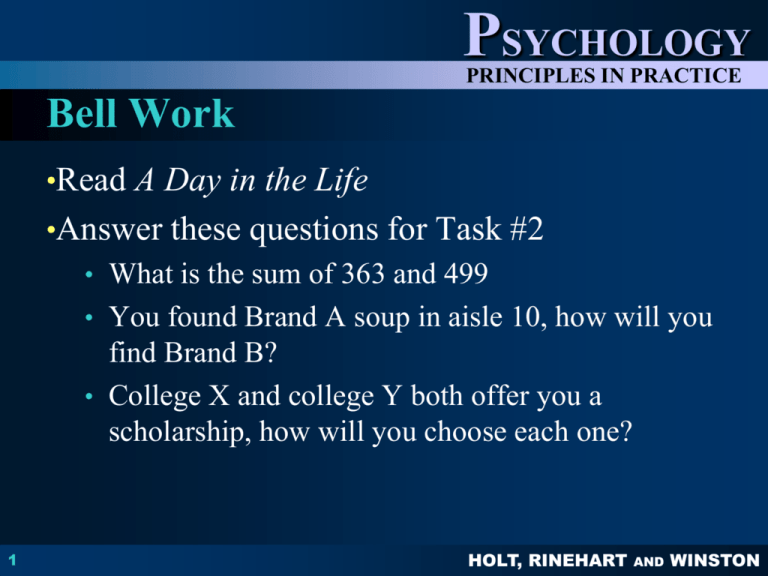
PSYCHOLOGY PRINCIPLES IN PRACTICE Bell Work •Read A Day in the Life •Answer these questions for Task #2 • What is the sum of 363 and 499 • You found Brand A soup in aisle 10, how will you find Brand B? • College X and college Y both offer you a scholarship, how will you choose each one? 1 HOLT, RINEHART AND WINSTON PSYCHOLOGY PRINCIPLES IN PRACTICE Chapter 8 THINKING AND LANGUAGE Section 1: What Is Thinking? Section 2: Problem Solving Section 3: Reasoning Section 4: Decision Making and Judgment Section 5: Language 2 HOLT, RINEHART AND WINSTON Chapter 8 PSYCHOLOGY PRINCIPLES IN PRACTICE Motivator “Dog” Form a mental picture of this word What did you come up with? You just illustrated the 3 units of thought Symbols, concepts, prototypes 3 HOLT, RINEHART AND WINSTON Chapter 8 PSYCHOLOGY PRINCIPLES IN PRACTICE Task #2 and 3 #3: Write down the T/F from pg. 178 #4: PQ4R Section 1: Based on the its initial Title…..hint……… should be 4 ?’s You should be able to answer these questions later 4 HOLT, RINEHART AND WINSTON Chapter 8 PSYCHOLOGY PRINCIPLES IN PRACTICE Thinking is…… 1. thinking is the mental activity that is involved in the understanding, processing, and communicating of information. Made possible through the use of symbols, concepts, and prototypes. 5 HOLT, RINEHART AND WINSTON Chapter 8 Section 1: What Is Thinking? PSYCHOLOGY PRINCIPLES IN PRACTICE Question: What are the three units of thinking? THREE UNITS OF THOUGHT SYMBOLS – objects or acts that stand for something else CONCEPTS – mentally grouping together objects, events, or ideas that have similar characteristics such as dogs, horses, etc. PROTOTYPES – examples of concepts that best exemplify that concept 6 HOLT, RINEHART AND WINSTON PSYCHOLOGY Chapter 8 PRINCIPLES IN PRACTICE Question: What are the three units of thought? Thinking 7 Symbols Concepts Prototypes HOLT, RINEHART AND WINSTON Chapter 8 PSYCHOLOGY PRINCIPLES IN PRACTICE Lesson Closing Go over Thinking about Psychology Answers Task #5: Read/Respond to Case Study Reading in back of room Keep this packet in your folder 8 HOLT, RINEHART AND WINSTON Chapter 8 Home PSYCHOLOGY PRINCIPLES IN PRACTICE US Flag: What do the stars and stripes mean? 9 HOLT, RINEHART AND WINSTON Chapter 8 Home PSYCHOLOGY PRINCIPLES IN PRACTICE What are all of these? 10 HOLT, RINEHART AND WINSTON Chapter 8 Home PSYCHOLOGY PRINCIPLES IN PRACTICE When you hear the word “Paper” what do you think of? 11 HOLT, RINEHART AND WINSTON Chapter 8 PSYCHOLOGY PRINCIPLES IN PRACTICE Bell Work Get books/folders Task #6 Solve problems A-E of Figure 8.1 on pg. 180 Go over answer to A 12 HOLT, RINEHART AND WINSTON Chapter 8 PSYCHOLOGY PRINCIPLES IN PRACTICE Task #7: PQ4R Section 2 What is problem solving? What are Algorithms and Heuristics? What are some Problem solving methods? 4 More Questions 13 HOLT, RINEHART AND WINSTON Chapter 8 PSYCHOLOGY PRINCIPLES IN PRACTICE What are Algorithms and Heuristics Algorithms: a specific procedure that, when used properly and in the right circumstances, will always lead to the solution of a problem. Ex: formulas. Heuristics: rules of thumb that often, but not always, help us find the solution to a problem. They are shortcuts. Ex: C_ _ FF (cliff) 14 HOLT, RINEHART AND WINSTON Chapter 8 PSYCHOLOGY PRINCIPLES IN PRACTICE Problem Solving Methods: 9’oclock partners Trial/Error Difference Reduction Means-End Analysis Working Backward Analogies 15 HOLT, RINEHART AND WINSTON Chapter 8 PSYCHOLOGY PRINCIPLES IN PRACTICE What is Insight/Incubation? Insight: coming to understanding suddenly incubation effect: When we arrive at the solution to a problem when we have not been consciously working on the problem. Ex: taking a break from math problem then suddenly coming up with the solution. 16 HOLT, RINEHART AND WINSTON Chapter 8 PSYCHOLOGY PRINCIPLES IN PRACTICE What are some obstacles to solving Problems mental set: the tendency to respond to a new problem with an approach that was successfully used with similar problems. Can sometimes solve a problem, can sometimes cause a problem functional fixedness: is the tendency to think of an object as being useful only for the function that the object is usually used for. 17 HOLT, RINEHART AND WINSTON Chapter 8 PSYCHOLOGY PRINCIPLES IN PRACTICE What is meant by creativity and problem solving? (popcorn) convergent thinking: though is limited to available facts, one tries to narrow thinking to find the single best solution. divergent thinking: one associates more freely to the various elements of a problem. One follows leads that run in various directions; perhaps one that will lead to the solution unexpectedly. 18 HOLT, RINEHART AND WINSTON Chapter 8 Section 2: Problem Solving PSYCHOLOGY PRINCIPLES IN PRACTICE Question: What steps can be used to solve problems? THE ABCDEs OF PROBLEM SOLVING Assess the problem Brainstorm approaches to the problem Choose the approach that seems most likely to work Do it – try the most likely approach Evaluate the results 19 HOLT, RINEHART AND WINSTON Chapter 8 PSYCHOLOGY PRINCIPLES IN PRACTICE Lesson Closing Look @ figure 8.6 to solution C-E 20 HOLT, RINEHART AND WINSTON Chapter 8 PSYCHOLOGY PRINCIPLES IN PRACTICE Bell Work Task #8: Attempt to problem solve Figure 8.3 on pg. 186 Will Draw example of answer on board Task #9 Complete thinking about psychology pg. 188 21 HOLT, RINEHART AND WINSTON Chapter 8 PSYCHOLOGY PRINCIPLES IN PRACTICE Task #10: PQ4R Section 3 What is reasoning? 2 more ?s Read entire section 22 HOLT, RINEHART AND WINSTON Chapter 8 PSYCHOLOGY PRINCIPLES IN PRACTICE Key Vocabulary Reasoning Use of information to reach conclusions Premise An idea or statement that provides the basic information that allows us to draw conclusions 23 HOLT, RINEHART AND WINSTON Chapter 8 Section 3: Reasoning PSYCHOLOGY PRINCIPLES IN PRACTICE Question: How do deductive reasoning and inductive reasoning differ? DEDUCTIVE AND INDUCTIVE REASONING DIFFER 9. Deductive Reasoning – a conclusion is arrived at by reasoning from a general principle to a specific conclusion 10. Inductive Reasoning – a conclusion is arrived at by reasoning from many specific observations to a general principle 11. confirmation bias: tendency to prove, or confirm, one’s hypothesis rather than disprove it. 24 HOLT, RINEHART AND WINSTON Chapter 8 PSYCHOLOGY PRINCIPLES IN PRACTICE Examples Deductive All Men are Mortal Spiderman is a man Therefore Spiderman is Mortal All apples are a fruit Fruit grow on trees So, all apples grow on trees 25 HOLT, RINEHART AND WINSTON Chapter 8 PSYCHOLOGY PRINCIPLES IN PRACTICE Lesson Closing Task #11: Complete Thinking about Psychology on Pg. 191 Answer Task #9 as class Work on Projects 26 HOLT, RINEHART AND WINSTON Chapter 8 PSYCHOLOGY PRINCIPLES IN PRACTICE Bell work Task #12: PQ4R Section 4 What strategies can be used in Decision making? 4 more ?s Go over Answers to Task #11 27 HOLT, RINEHART AND WINSTON Chapter 8 Section 4: Decision Making and Judgment PSYCHOLOGY PRINCIPLES IN PRACTICE Question: What strategies can be made in decision making? STRATEGIES IN DECISION MAKING Weighing the Pluses and Minuses – choosing among goals or courses of action to reach goals by using a balance sheet Shortcuts in Decision Making and Judgment – use heuristics or shortcuts The Framing Effect (read)– refers to a way in which wording affects decision making 28 HOLT, RINEHART AND WINSTON Chapter 8 Section 4: Decision Making and Judgment PSYCHOLOGY PRINCIPLES IN PRACTICE Question: What strategies can be made in decision making? HEURISTICS OR SHORTCUTS Representativeness Heuristic – making decisions about a sample according to the population that the sample appears to represent Availability Heuristic – making a decision on the basis of information that is available in the immediate consciousness Anchoring Heuristic – making a decision based on certain ideas or standards that a person holds and which hold an anchor for the person 29 HOLT, RINEHART AND WINSTON Chapter 8 Section 4: Decision Making and Judgment PSYCHOLOGY PRINCIPLES IN PRACTICE What is Over-Confidence? People tend to have too much confidence in their decisions, right or wrong Reasons Unaware of how flimsy evidence is Pay attention to ex.’s that confirm, ignore those that do not Tend to bring about things they believe in Studying for a test when you think you are capable of an A if you do 30 HOLT, RINEHART AND WINSTON Chapter 8 PSYCHOLOGY PRINCIPLES IN PRACTICE Lesson Closing Watch part of video: Thinking and Language Finish it tomorrow Test Monday 31 HOLT, RINEHART AND WINSTON Chapter 8 PSYCHOLOGY PRINCIPLES IN PRACTICE Bell Work Task #13: Thinking bout Psych. Pg.194 Finish Video Test Monday 32 HOLT, RINEHART AND WINSTON Chapter 8 PSYCHOLOGY PRINCIPLES IN PRACTICE Task #14 PQ4R Section 5 5 ?s 33 HOLT, RINEHART AND WINSTON Chapter 8 PSYCHOLOGY PRINCIPLES IN PRACTICE What is Language and its components? The communication of ideas through symbols that are arranged according to rules of grammar 34 HOLT, RINEHART AND WINSTON Chapter 8 Section 5: Language PSYCHOLOGY PRINCIPLES IN PRACTICE Question: What are the basic elements of language? BASIC ELEMENTS OF LANGUAGE Phonemes – basic sounds of a language Morphemes – units of meaning in language Syntax – way in which words are arranged to make phrases and sentences 35 HOLT, RINEHART AND WINSTON Chapter 8 PSYCHOLOGY PRINCIPLES IN PRACTICE What are Semantics Semantics (Read aloud) Study of word meaning Involves the relationship b.t. languages and the things depicted in language 36 HOLT, RINEHART AND WINSTON Chapter 8 PSYCHOLOGY PRINCIPLES IN PRACTICE What are the Stages of Language Dev.? Crying, cooing, and Babbling Most effective form of expression for newborns Similar World wide up to 9-10 months Words, Words, Words Beginning of word formation and TRUE language 18 months = 24 words Overextension: Extending meanings to refer to things they don’t yet have words for Dev. Of Grammar (Read aloud) Age development gradually leads to the increase of words in a sentences to convey their meaning Over-regularization: applying normal rules to all words 37 HOLT, RINEHART AND WINSTON Chapter 8 PSYCHOLOGY PRINCIPLES IN PRACTICE How do we learn language? Hereditary Influences (LAD) Language acquisition device which people believe we have the natural tendency to acquire language Environmental Influences Children learn language in part, by observing and imitating other people 38 HOLT, RINEHART AND WINSTON Chapter 8 PSYCHOLOGY PRINCIPLES IN PRACTICE What is Bilingualism? Bilingualism Ability to speak more than one language The earlier a child starts on another language the better as research supports 39 HOLT, RINEHART AND WINSTON Chapter 8 PSYCHOLOGY PRINCIPLES IN PRACTICE Lesson Closing Task #14 Exploring Diversity Answer: pg. 197 Task #15: Case Study: Answer pg. 200 Task #16: Time to work on Monday Thinking bout Psych: pg. 201 40 HOLT, RINEHART AND WINSTON
